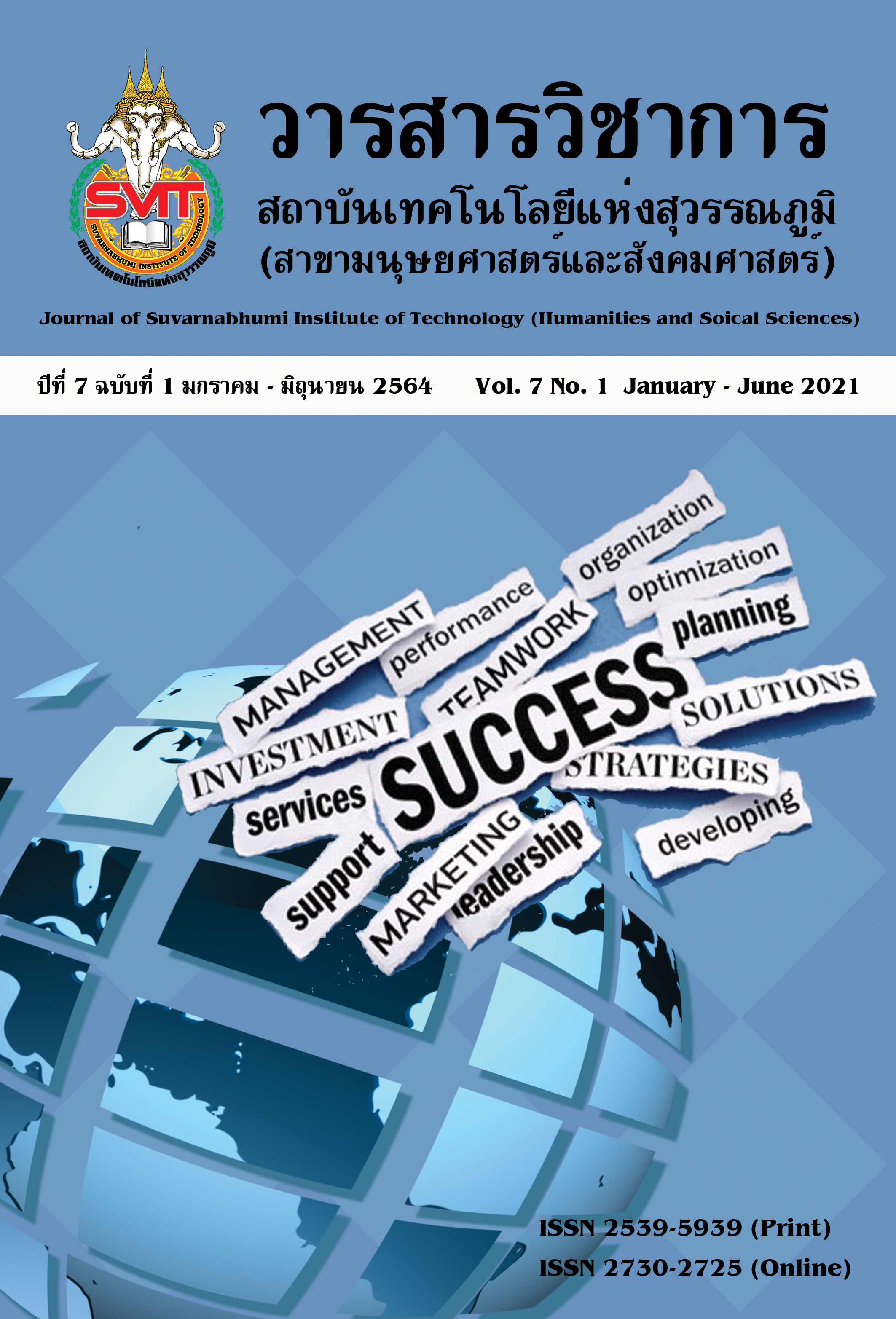THE DEVELOPMENT OF TRAINING MODEL FOR OCCUPATIONAL COMPETENCIES OF INDUSTRIAL HYDRAULIC TECHNICIAN
Keywords:
Occupational, Competency Industry Hydraulic TechnicianAbstract
This research aims were to find out the occupational competencies, training model and training module in the field of industrial hydraulic technicians. There are 5 steps to conduct research: 1) Developing occupational competencies standards of industrial hydraulic by 10 experts evaluated and gave suggestions for improvement the proposed occupational competencies lists. 2) Developing the training model of industrial hydraulic technicians by using the System Approach method, 5 experts evaluated the suitability and gave suggestions. 3)Developing the training module for industrial hydraulic technicians under 5 experts supervising to find the index of congruence (IOC) of behavioral objectives with the evaluation criteria, the validity of the test and performance assessment and the appropriateness of the training module. 4) Providing training on occupational competencies of industrial hydraulic technicians in both parts, in the form of regular training and training through the online system by applying training modules to the group sample of 23 people.5) Assessment of trainees' competencies by 3 training assessors evaluation the performance of those trained through training and using the assessment form developed by the researcher together with the assessors The competencies assessment was based on knowledge and skills induced from the training process.
Research results: 1) Occupational standard of industrial hydraulic technicians comprised of 5 Key Functions, 28 Units of Competency and 71 Elements of Competency. 2) Training model for occupational competencies of industrial hydraulic technicians consisted of 6 components and was appropriate at a good level (= 4.60 , S.D = 0.894) 3) Training module of occupational competencies for industrial hydraulic technicians consisted of 8 learning outcomes. And the results of the assessment were at a good level (= 4.63, S.D = 0.548) 4) The training achievement of all 23 participants were at a higher level than 80 percentage. Trainees were satisfied with the training process was at a good level (= 4.54, S.D = 0.507) 5) The competencies training assessment results showed that all trainees had been passed the training criteria.This could say that the training system by using the competencies based curriculum which focused on the people competencies and trained competencies-based would effect to manpower development consequences more efficient and in line with the needs of enterprises sectors and in accordance with the guidelines for the development of the country's competitiveness.
References
กฤษมันต์ วัฒนาณรงค์. (2553). สมรรถนะวิชาชีพ. กรุงเทพมหานคร: ศูนย์ผลิตตําราเรียน มหาวิทยาลัยเทคโนโลยีพระจอมเกล้าพระนครเหนือ.
กีรติ ยศยิ่งยง. (2549). ขีดความสามารถ (พิมพ์ครั้งที่ 1). กรุงเทพฯ: มิสเตอร์ก๊อปปี้
คมธัช รัตนคช. (2552). การแปลงมาตรฐานสมรรถนะมาเป็นหลักสูตรฐานสมรรถนะ. สืบค้นเมื่อ 7 กันยายน 2559, จาก http://home.dsd.go.th/techno/trainingsystem/index.php?option=com_content &view=article&id=65%3A2010-02-04-05-35-39&catid=49%3Acbc&Itemid=59
คมธัช รัตนคช, และดนุพล คลอวุฒินนท์. (2552). รูปแบบการฝึกที่เหมาะสมกับการพัฒนาทักษะปฏิบัติ. สืบค้นเมื่อ 7 กันยายน 2559, จาก http://home.dsd.go.th/techno/trainingsystem/index.php?option=com_content&view=article&id77:2010-05-05-04-47-36&catid=53:-53-2& Itemid=71
จงกลนี ชุติมาเทวินทร์. (2544). การฝึกอบรมเชิงพัฒนา (พิมพ์ครั้งที่ 2). กรุงเทพฯ: พี เอฟ ลีฟวิ่ง จํากัด.
จะเด็ด เปาโสภา, และมนตรี พรหมเพ็ชร. (2548). การพัฒนามาตรฐานสมรรถนะเพื่อนําไปสู่การพัฒนามอดูล. ในเอกสารประกอบการประชุมทางวิชาการ เรื่อง การพัฒนามาตรฐานอาชีพเพื่อนำสู่การจัดทำหลักสูตรฐานสมรรถนะสำหรับ 15 กลุ่มวิสาหกิจยุทธศาสตร์.สืบค้นเมื่อ 2 สิงหาคม 2559, จาก http://www. nsdv.go.th/industrial/competence/download/3-competence.pdf
ชนะ กสิภาร์. (2549). “หลักการของนวัตกรรมและนวัตกรรมทางด้านอาชีวศึกษาและการฝึกอบรม” (เอกสารประกอบการสอนนักศึกษาระดับปริญญาเอก รายวิชานวัตกรรมการศึกษา). กรุงเทพมหานคร: คณะครุศาสตร์อุตสาหกรรม สถาบันเทคโนโลยีพระจอมเกล้าพระนครเหนือ.
ชนะ กสิภาร์. (ม.ป.ป.). การพัฒนาฐานสมรรถนะ. สืบค้นเมื่อ 2 สิงหาคม 2559, จาก http://www.nsdv.go.th/industrial/competence/download/profchana.pdf
ชาญ สวัสดิ์มาลี. (2542). คู่มือนักฝึกอบรมมืออาชีพ: การจัดดําเนินการฝึกอบรมอย่างมีประสิทธิผล (พิมพ์ครั้งที่ 2). กรุงเทพฯ: สวัสดิการสํานักงาน ก.พ.
ชูชัย สมิทธิไกร. (2551). การฝึกอบรมบุคลากรในองค์การ. กรุงเทพฯ : สำนักพิมพ์แห่งจุฬาลงกรณ์หาวิทยาลัย
Cascio, Wayne F. (1986). Management Human Resoures: Productiviy, Quality of Work Life, Profits. New York: McGraw-Hill,
Davies, I. K. (1971). The Management of Learning. London: McGraw-Hill.
Downloads
Published
Issue
Section
License
The articles published are copyrighted by the Sarasas Journal of Humanities and Social Science. The opinions expressed in each article in this academic journal are those of the individual authors and do not reflect the views of Sarasas Suvarnabhumi Institute of Technology. The authors are solely responsible for all aspects of their respective articles. Any errors or inaccuracies in the articles are the sole responsibility of the authors.



